
EEAT on Steroids - How are 'your money or your life' brands doing it?

You work in marketing and the SEO team keeps mentioning EEAT? They're using the words authority, and trust on a regular basis and you’re pressured to move fast to make changes? Well here it is in practice, and how leading websites in news and healthcare are setting an example.
What is EEAT?
In the context of SEO, EEAT stands for Experience, Expertise, Authority and Trust and is set by Google as guidelines for best in practice high quality SEO.
It is a concept that was introduced by Google in their Search Quality Evaluator Guidelines as a way to assess the quality and credibility of web pages.
Here's a brief explanation of each component:
1. Experience - various factors that contribute to how users interact with and perceive a website. Looking at both their experience before and after visiting, the search experience and how the brand connects the customer to lead to a conversion
2. Expertise: This refers to the knowledge and expertise demonstrated by the content creator or the website in a particular field or subject. It's important to showcase your expertise through high-quality, accurate, and well-researched content and using authors that have displayed true credentials behind their knowledge.
3. Authoritativeness: Authoritativeness relates to the reputation and authority of the website or content creator within their industry or niche. It can be enhanced by establishing backlinks from other authoritative websites, being cited as a source, or having recognition from industry experts
4. Trustworthiness: Trustworthiness refers to the reliability and trustworthiness of the website or content. Factors that contribute to trustworthiness include having a secure website (HTTPS), clear and transparent information about the content creators, and avoiding deceptive practices. Links are also a signal of trust, when coming from authoritive sources through digital PR
How to improve my E-A-T score in SEO?
Improving your E-A-T score involves focusing on these elements to enhance the quality and credibility of your website. Here are some general tips:
1. Produce high-quality content: Create well-researched, accurate, and comprehensive content that demonstrates your expertise in the subject matter
2. Showcase credentials and expertise: Highlight the qualifications, experience, and expertise of the content creators or authors. Provide clear information about their background, education, and professional achievements
3. Establish authority and reputation: Seek opportunities to be recognized as an authority in your field. This could involve guest posting on reputable websites, obtaining backlinks from trusted sources, and receiving mentions from industry influencers
4. Enhance website trustworthiness: Ensure your website is secure, has a clear privacy policy, and provides accurate and reliable information. Build trust with your audience by displaying customer testimonials, reviews, and other forms of social proof.
EEAT examples
One of the leading health sites for advice, news and guidance in medical, Healthline, recently suffered a slight decline after Google rolled out the helpful content update, scoring the site as potentially untrustworthy and lacking authority.
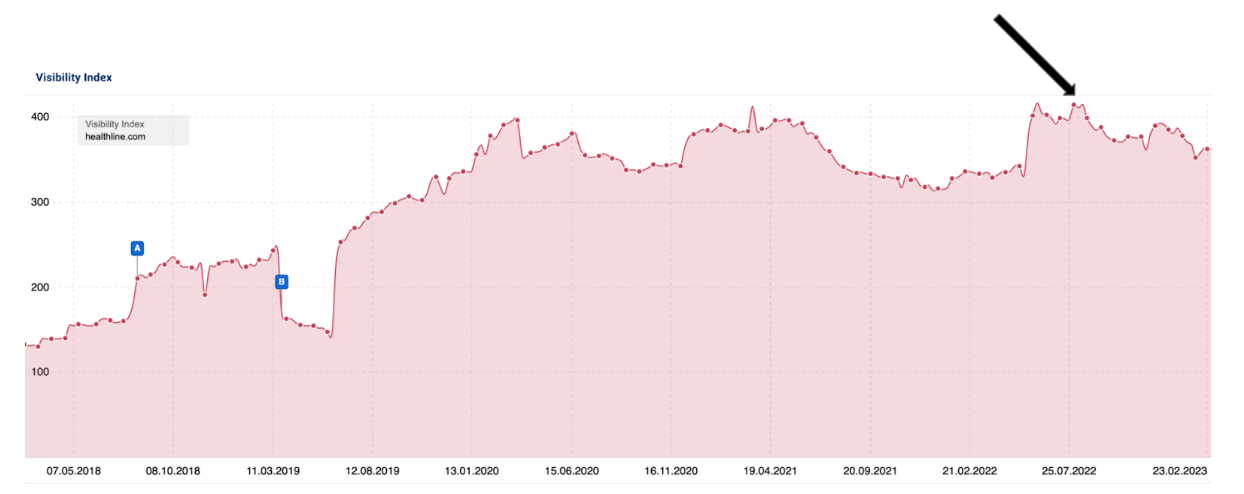
Did it mean the content was weak, including false facts? absolutely not.
But within the health and medical category which is within “your money or your life” category, Google gives extra care and attention to the advice given out to its users, to ensure it is the very best of highest quality content.
This means their content was forced to be reviewed. Looking at the quality of the content, the expertise that was being displayed, how they can display better signals of authority and trust. So here’s what they did…
Healthline has rolled out a process to ensure every piece of content given to its readers is now written firstly by experts. Not marketers, but experts. Expert writers within health.
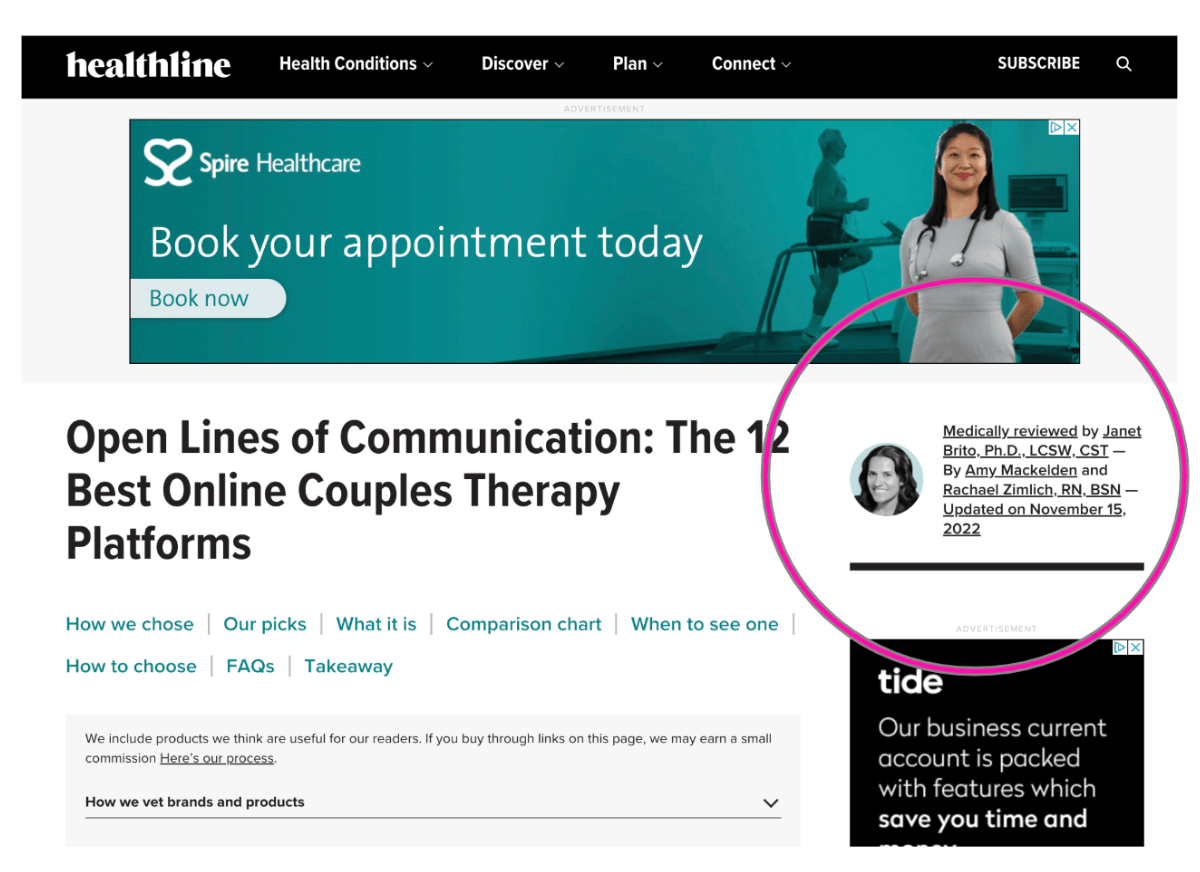
Example of EEAT authors
They’re adding expert authors to every bit of content onsite, and in some cases - multiple authors like the above. Because if 3 experts within medical produced the advice - it has a higher chance of satisfying Google's eagle eye on signals of expertise. Each author's name is clickable, which sends you off to a biography about that author, including other stories they have written on Healthline's site. Allowing the user to see for themselves and build trust with those writing the articles.
However, they needed to go one step further and give Google signals of authority.
And what’s better than a strategy where every piece of content is reviewed by and approved by a medical professional. This “medically reviewed by X” feature is now being added to each piece of content and rolled out over a series of months.
This tells users (and Google) that this has been fact checked and approved by medical professionals and therefore should be trusted.
However, within SEO it's very easy to say “they’re a medical professional”. Without users or Google physically crawling University databases for certifications or social media profiles for even more signals - it's not clear how authoritative they are, and/or whether they are in fact either. So what else could they do to build trust with users and Google too?
A trustworthy, authoritative person is nearly always referenced somewhere else online. They have research papers, studies, advice and news submitted and shared to other authorities online. This is where link building comes in.
Using those medical professionals, Healthline found a way to show trust signals to users and Google. They worked with them to produce comments, data and studies away from Healthline's site, get featured in national, medical and industry sites. And then linking back to the authors page.
Using experts to produce studies, comments and data offsite to land links onsite
Healthline used medical experts like “Janet and Amy” to comment on global health news, studies and data with international media in a way to get links back to site. When their comment was used alongside an article in a high authority article, they would link to their bio on Healthline's website.
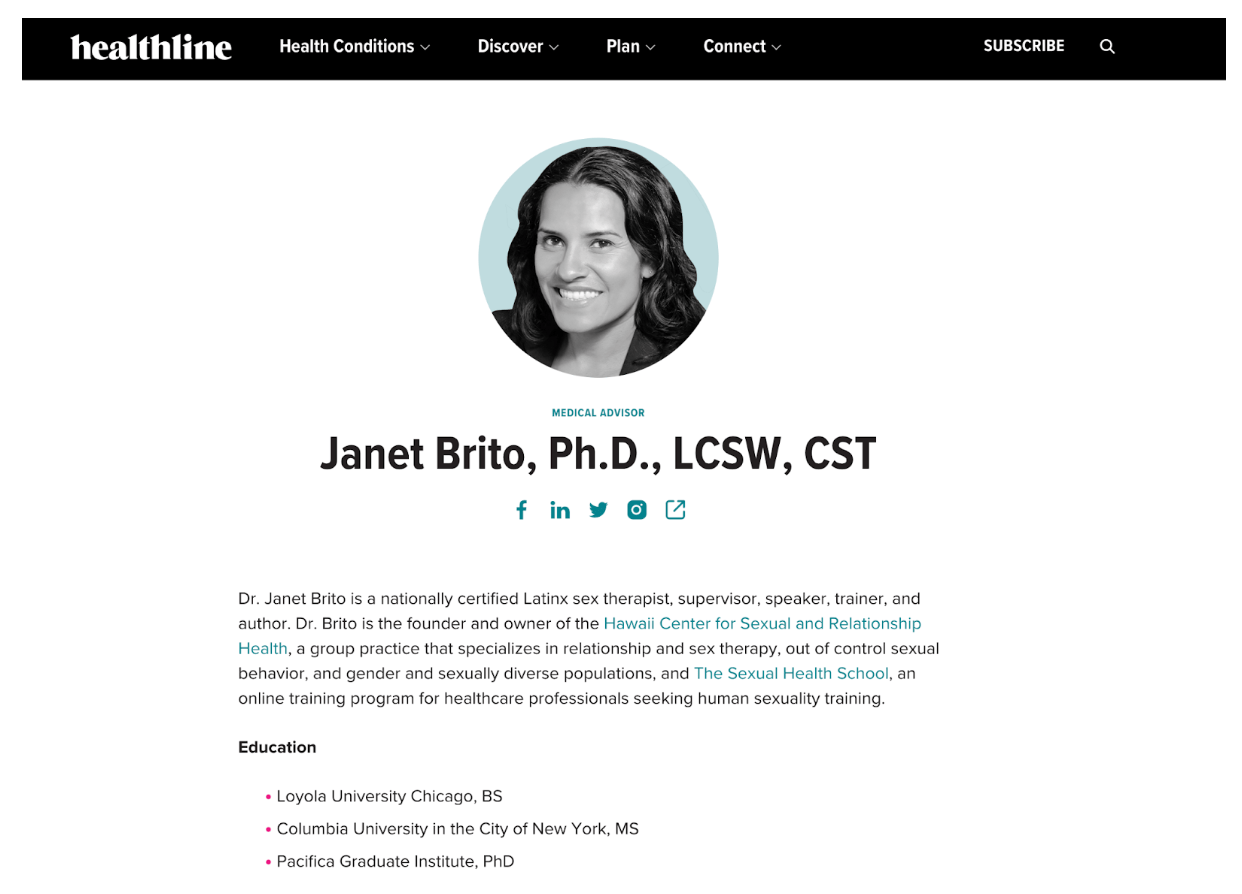
These publications including Medical News Today, Philly News and more were then used as signals of trust to show that these were in fact trustworthy authorities on their subject matter.
Here's an example of Janet Brito providing a comment to press landing a link back to her bio page on Healthline's site.
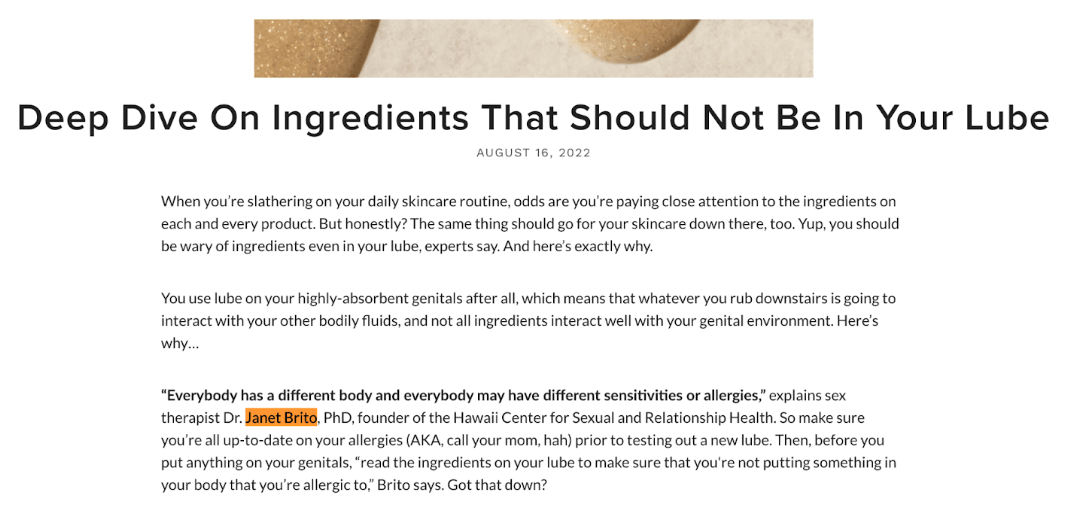
And here's the growing backlink profile to Janet's author page from this activity.
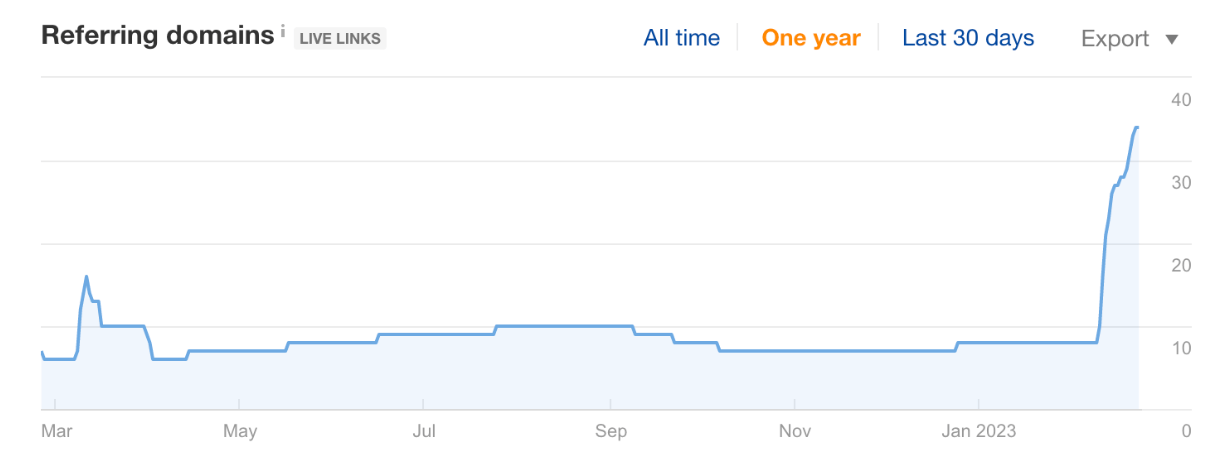
The logos of “featured in” publications would be placed onsite to show its readers that you should trust their medical advice. Over 47 linking domains were pointing to one bio (Janets) and in some cases over 100.
This is how Healthline is turning round a decline and generating an author strategy that others are taking inspiration from.
Another example of EEAT - Forbes Advisor
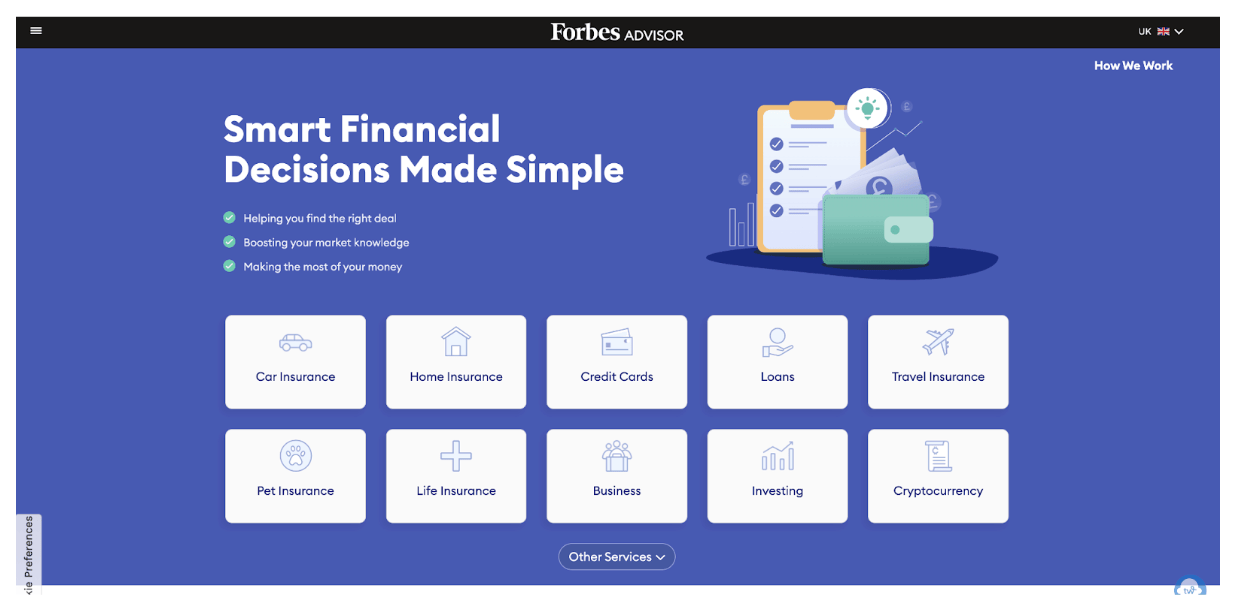
Forbes Advisor - on a mission to take over rankings for life insurance, home insurance, credit cards and more in order to drive revenue through the Forbes domain - rolled out this exact strategy. As an affiliate site, they need to be doing this at the very least for Google to really trust their content.
Again these topics are in the “your money or your life” category and therefore Google takes extra care to ensure the best result is presented to searchers.
Forbes Advisor has the backing of an already existing, powerful and authoritative domain - Forbes.com. With a high domain authority and links pointing to the site, this allows Forbes to start off on a good foot when it comes to gaining rankings.
With content being produced at scale, Forbes recognised the need to also show they had experts who were authoritative and to build trust with Google. They also repeated the same strategy, added multiple authors and “approved by” features boosting rankings. In fact they even added 3 authors per content to really drive this.
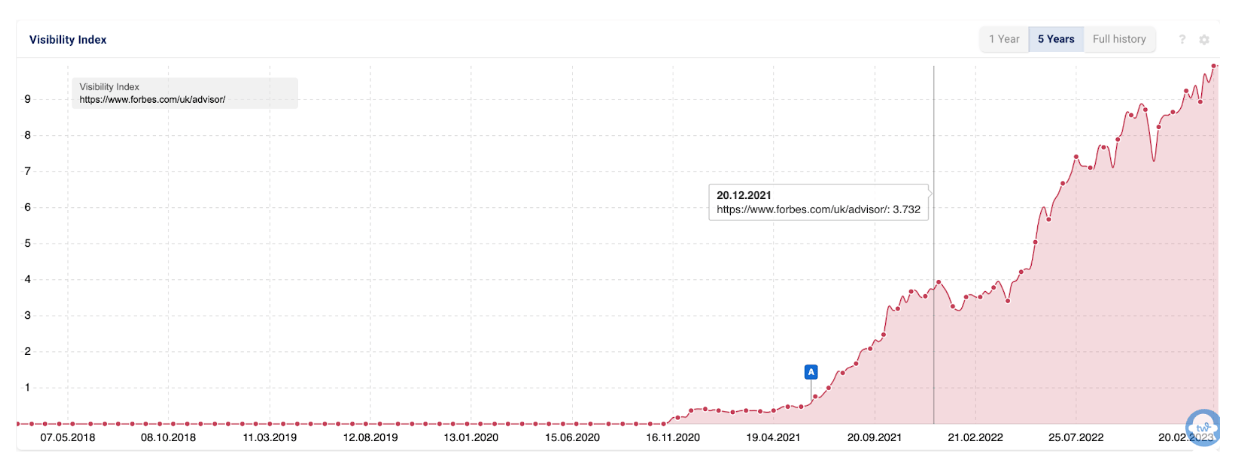
Forbes Advisor organic visibility growth
Forbes Advisor has also been building links in the masses, a new 5,000 domains both naturally and proactively have been built to the site through similar tactics to Healthline. Not just comments, but data studies, research pieces and indexes.
Should I be adding multiple authors to my content?
As always, it depends. First of all, if you’re reading this without any authors, start there. Create authors within your CMS, build out author pages and bios and link to other articles they’ve produced. That’s the very first thing every website should be doing right now to improve rankings. We did this for a client in the car insurance space 3 years ago and this was the result
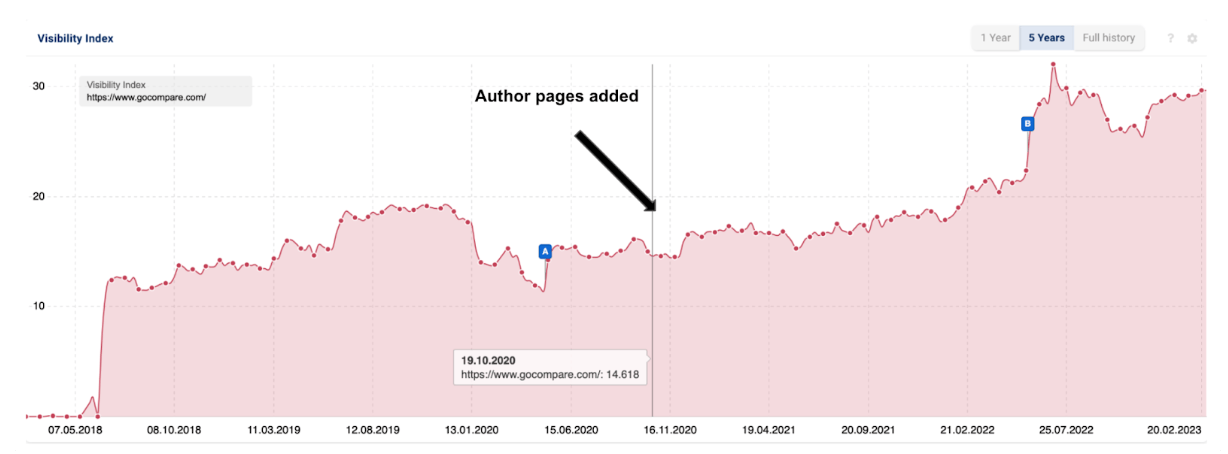
Sistrix visibility graph showing when Gocompare added author pages
Adding multiple authors is a big question. For money or your life categories - you will benefit from this. But is it a necessity to rank well - no.
Who is best to add as authors to on-site content?
Brands tend to add marketing people as authors of content, CEOs or business owners and whilst this isn’t the end of the world it isn’t recommended. You need to focus on experts within your niche that can and do have an opinion, or trusted advice around each topic.
But where can you find them? Thats the hardest part. Thats why we have been busy creating our very own network of authors, experts in every niche!
The Rise Network has experts in finance, health, fashion , beauty, automotive, and more all pre vetted and checked with existing offsite trust signals. If you work with us, we will use our network to create the best in class content and use their authority to build content at scale, brand awareness and press coverage too.
Here’s some examples of experts in each industry within your business that would be best to place as authors:
- Car Insurance: Insurance ombudsman, policy writers
- Fashion: buyers and product designers
- Beauty: buyers and product designers
- Travel: Travel and tourist bookers/advisors, local people from those areas
- Personal finance: bankers and financial advisors or even University students (money saving tips)
- Mortgage: mortgage advisors
- Home and property: interior designers, builders/construction
- Health: doctors, medical practitioners
If your industry isn’t above, get in touch and we can advise you of the best way to build out authors on your onsite content
Should I be getting my content reviewed and approved by experts in the niche?
Having an expert review the advice given out, is not just a good sign to Google but the experience users will go through will pay off in the long term.
This is a sure fire way to beat competitors for longer tail keywords and search queries. Would I add experts for categories outside your money or your life? Absolutely, yes. If you’re in fashion, beauty, automotive or food and drink - it can only add value getting an industry leading authority approving the content onsite and even acting as a sort of brand ambassador/approver.
Finding these is often the challenge, but this is something we can help with. We have a pool of experts that write for third party websites and act as experts for your brand to help drive authority across all different clients and industries.
How to build links to author pages and expert articles?
Here’s our award winning way which is efficient, high performing and low effort too.
We use reactive marketing to provide data on trending health, finance, travel and more stories, as well as comments, thought leadership or reports. This is then used to build links to author pages as well as category pages too.
Here's the process:
- Build out a team of experts/authors available to comment on industry news, trends, events and research. It is ok to use third party experts as long as you build wide content and author pages onsite
- Track industry breaking news to ensure you can be the first to add comment/data or extra value using your experts and no-one else
- Pull a list of publications and journalists which cover these topics repeatedly and especially ones which include external experts. Remember journalists need experts to give authority and trust to their articles. You could simply be the brand providing them with that.
- Get your content ready - whether its a research piece that would add value, a comment or a piece of data put it in a press release ready to send to press. We typically create an email outreach consisting of no longer than 3 paragraphs. Keep it to the point fast enough for a journalist to use it.
- Send out to relevant media - be kind, test your subject titles to ensure you’re going to get clicks and opens and be useful. The best tool to test email opens is Buzzstream
- Wait for the links to roll in, whilst building relationships with the media.
- Use AHREFS to track links pointing back to the site. Don’t lose hope if you don’t get covered, learn and try again
This is a process that may take 3-6 months to get off the ground and generate results therefore takes patience, creativity and someone who knows the media well.
We have a dedicated team and service of Digital PRs trained on reactive marketing for over 10 years working on this strategy for all clients across multiple industries. We have built a network of experts for our clients (for those that didn’t have access to any themselves) and created the process that is gaining over 200 links a year minimum to site.
In fact the media now come to us for experts.
More Rise at Seven campaign examples can be found here


CEO & Founder of Rise at Seven, and my job is to be out in the market and see which way the wind is blowing in the next 1, 2, 5 or 10 years time and bring that home to my team and clients. I lead the vision of the agency across the UK & US.















